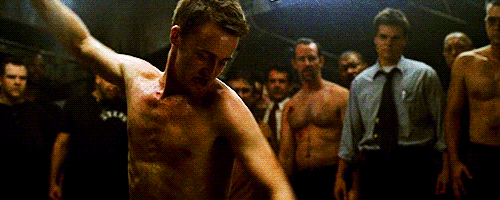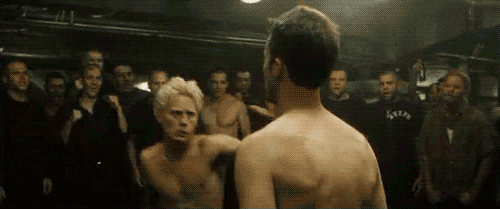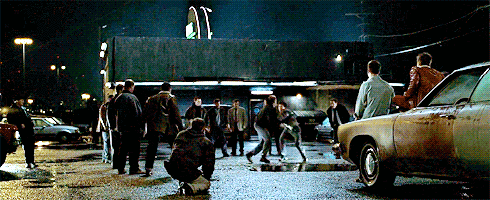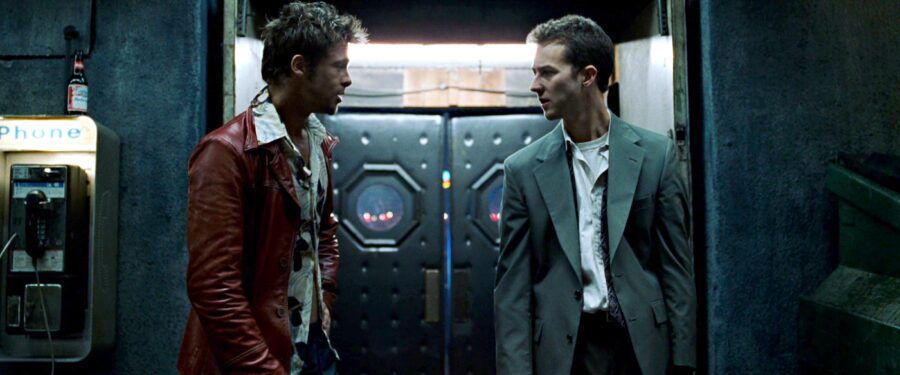15th anniversary of Fight Club: Cult classic stands the test of time a generation later
“If you are reading this then this warning is for you. Every word you read of this useless fine print is another second off your life. Don’t you have other things to do? Is your life so empty that you honestly can’t think of a better way to spend these moments? Or are you so impressed with authority that you give respect and credence to all who claim it? Do you read everything you’re supposed to read? Do you think everything you’re supposed to think? Buy what you’re told you should want? Get out of your apartment. Meet a member of the opposite sex. Stop the excessive shopping and masturbation. Quit your job. Start a fight. Prove you’re alive. If you don’t claim your humanity you will become a statistic. You have been warned… Tyler”
—Subliminal message hidden in the opening credits of Fight Club.

First Rule of Fight Club:
You do not talk about Fight Club.
Fifteen years ago today Fight Club made its premier at the box office. The movie was considered a flop grossing only $37 million of its $63 million budget and losing to movies like 10 Things I Hate About You and Deuce Bigalow: The Male Gigolo in its 1999 premier. Fight Club has since become a cult classic with close to $100 million in D.V.D. sales. The dollar signs alone are not a measure of its success. The film’s ability to stay politically and socially relevant to the problems and attitudes of the Millennial Generation that came after the film’s intended audience, the Generation X, make Fight Club a timeless cinematic work with a loyal and growing fan following.
The film is an adaptation of the 1996 novel of the same name written by Chuck Palahniuk and directed by David Fincher. Actor Edward Norton plays the nameless narrator, a car company employee afflicted by insomnia and disillusioned with his personal life of endless consumerism and failed personal relationships. On a business trip, the narrator runs into a soap salesman by the name of Tyler Durden played by Brad Pitt. They exchange contact information before parting ways. When the narrator gets to his apartment building, he discovers that an explosion has blown out all of his possessions onto the street below. Not having anyone to stay with, he calls Durden. They meet at a bar and they have a conversation about consumer culture where Durden says, “It’s only after we’ve lost everything that we’re free to do anything.” Durden offers the narrator a place to stay but only under one condition- that the narrator hits him in the face. Both characters take out their aggression on each other in the parking lot of a the shaky topless bar. Eventually other men start to join in and Fight Club is born.
Fight Club turns into an anarchist organization called “Project Mayhem” whose mission is to destroy consumer and corporate organizations through acts of vandalism. The narrator’s own life becomes controlled by Tyler Durden and Fight Club becomes a national underground organization with chapters in all major cities. After the narrator discovers that Durden and Project Mayhem are plotting to destroy five major credit card company buildings, he sets out to stop Durden from accomplishing his goal. There’s only one problem, and the film’s groundbreaking twist is revealed- the narrator and Durden are two personalities in the same body. The nameless narrator created Durden to escape his own mundane and meaningless world of conformity and consumerism.

Second Rule of Fight Club
You DO NOT talk about Fight Club.

The main character in Fight Club is over worked and stressed to the point of insomnia and insanity. His world revolves around doing what he is told at work, and buying what he is told at home. We all try to fit into the world by doing the very thing others expect us to do: go to school, get a job, get married, have children, and pay taxes before we die. The consequence to living out someone else’s expectations is the loss of your own personal happiness. Go to school: the average college student survivor graduates with $29,400 in debt and a piece of paper that lets your employer know that you are trainable and obedient. Get a job: in 2013 there were 9.3 million Americans unemployed and looking for a job, but there were only 4.6 million job openings that year. Do the math. American society considers unemployment the fault of the worker, but unemployment is a structural social problem. —I am Jack’s complete lack of surprise.— No amount of job fairs, polished resumes, and business card transactions can give one a job that does not exist.
These statistics should make your stomach turn when you daydream about your future. These statistics should want to make you escape the path laid down before you. These statistics should make you develop a second personality so that you can live out the life you wish you had? –Probably not. But this is the reason so many young Americans have embraced Fight Club as a personal manifesto. The ones making their way through college right now have to step into the shoes of the generation before them and wear them to their graves. Fight Club rejects this conformist view. Why should the values of your parents be passed down to you like male pattern baldness or diabetes?

Third Rule of Fight Club:
If someone says “stop,” goes limp, or taps out; the fight is over.

Many people consider Fight Club a sexist and misogynistic film. The film is not about male aggression or male superiority like so many other critics have exclaimed. The film is about rejecting the gender roles imposed by the consumer culture on men. Smell better, have someone’s name on your under wear, drive a sports car and spend your free time pushing weights and drinking protein shakes at the gym. The narrator starts off in the movie with insomnia, and a lot of internalized frustration towards his life with no emotional support from anyone around him. He has to pretend he is dying in order to find emotional release in the arms of strangers in support groups for terminally ill people.
Men are supposed to be tough, have direction, look masculine and sexy, have their life in order and show no emotion. Men are not given the option to say “stop,” or tap out. There is an expectation that men are supposed to hide their emotions and never admit they need help. The extreme would be starting an under ground club to take out your aggression, but the subtle message is this: the narrator had a mental disorder that went unnoticed until it spiraled out of control. Men’s health needs are often ignored and/or misunderstood. The pressure of men to live out a macho persona is alienating them from emotional and psychological support.
A report by the nonprofit Blue Star Families estimates that 60 percent of men in the military who have post-traumatic stress disorder (PTSD) are not seeking treatment in or outside of the military. The report was conducted by surveying the spouses of the soldiers. Those who do seek treatment usually drop out early in the process. Men kill themselves in larger proportions than women. The suicide rate of a male increases with age up until the age of 40.
Tyler Durden embraced the idea that life is not pretty and perfect; it is ugly and messy. Life should not be spent trying to leave the most clean cut, scar free, and wealthy corpse you can leave behind; we will only end up disappointing ourselves. The French philosopher Jean-Paul Sartre believed that there is no such thing as human nature; therefore, we can’t put a blame on humanity for our individual faults and bad decisions. We are solely responsible for the lives we choose to live. After we are able to take on such responsibility are we then free to call it quits, and tap out on any aspect of our lives we wish to change without the need for anyone’s approval.

Fourth Rule of Fight Club:
Only two guys to a fight.

Consider the opening scene of Fight Club where a man is thrusting the barrel of a gun into another man’s mouth; the scene where Tyler Durden takes a bath in front of the narrator; or the scene where the narrator savagely beats Angel Face on the suspicion that he is gaining more attention from Tyler Durden than he. The film has many not-too-subtle homoerotic scenes— at least that’s the opinion of many critics and analysts. What permeates through this film louder than the perceived homoeroticism is the reckless narcissism of the narrator. If one watches the film with the notion that the narrator and Tyler Durden are the same person, the perceived homoerotism takes on a very different context. Not one person is more intimate with anyone else as they are with themselves. The narrator’s admiration for Tyler Durden was only an admiration for himself. After all, no one ever talks about masturbation as a homosexual act. And the narrator’s ability to conjure up an alpha male alter ego to play out his aggression and frustration is no more than mental masturbation.
There is a sociological perspective that might explain the “bromance” between both characters without resorting to the idea of homoeroticism. While Tyler Durden is naked in the same room as the narrator, he says, “We’re a generation of men raised by women. I’m wondering if another woman is really the answer we need.” Both characters were part of Generation X who were raised by women at a time when feminism was dominant in the 1970s. Those mothers would have rejected the patriarchal aspects of family and encouraged emotional expression in men. The “bromance” has become a part of mainstream culture as men develop close non-romantic but affectionate relationships with one another. These kinds of social relationships develop often around a common interest, say, bringing about anarchy and blowing up credit card company buildings.

Fifth Rule of Fight Club:
One fight at a time.
A fight between two men (or himself) turns into a full house affair when the club moves into the basement of the bar. As the narrator’s grip on reality decays, Fight Club expands into a national organization with chapters in every major city. Comprised of blue collar workers, the vexation of capitalism by the men led by Tyler Durden transforms Fight Club into the anarchist organization Project Mayhem. The aggression from one man to another becomes the aggression from the consumer to the business elite. Project Mayhem has many parallels in reality with movements such as Anonymous and Occupy Wall Street. Anonymous appeared four years after the release of Fight Club in 2003 as a decentralized hacker community. Its first target was the Church of Scientology but later as the collective grew, their targets included world governments like Israel, the U.K. and Australia. Like Project Mayhem, Anonymous also targeted credit card companies like PayPal, MasterCard, and Visa.
In 2010 Anonymous launched operation “Payback is a Bitch” after a software company began an attack on pirate websites. Anonymous retaliated by shutting down the company’s networks claiming that the people have the right to spread information freely. Anonymous and Project Mayhem fall under the same parallel of nonconformist action against a perceived oppressor.

Sixth Rule of Fight Club:
No shirts, no shoes.
A major theme of Fight Club is the despair felt by an entire generation over the state of consumerism. The values of an advertisement are now the values of the culture. We are all held at the same standard of beauty, and manufactured products are a measure of our social status. Super Bowl ads are as much part of the show as the Super Bowl itself. Art and culture have been replaced with the regurgitation of celebrity gossip and fickle fashion trends. Tyler Durden said, “The things you own end up owning you.” The average household accumulates more then $15,000 in debt. The total consumer debt in America is over $11 trillion. We work for corporations, and give our money away to corporations- essentially we are working for free.

Seventh Rule of Fight Club:
Fights will go on as long as they have to.

When the narrator attended the support groups, his reason for going was that people really listened to him, instead of waiting for his turn to speak. In Fight Club, the two men fighting were like gods and the center of the world. Before Fight Club, the men were spectators of their own lives. During Fight Club, you held the rains to your own destiny clutched in your fists.
It is no surprise then that after the film’s release fight clubs sprung up all over the country. In Silicon Valley’s Menlo Park, the “Gentlemen’s Fight Club” has been on going every two weeks since the year 2000. Creator Gints Klimanis hosts the invitation only event to escape the monotony and office life of the high tech industry. The fights only last about 60 seconds and not as long as they have to as they do in the movie, but the intent is the same- escape the social pressure of everyday life.

Eight Rule of Fight Club:
If this is your first night at FIGHT CLUB, you HAVE to fight.
“On a long enough time line, everyone’s survival rate drops to zero,” warns the narrator. What will you do before your time expires? What will you wish you had done? We have become spectators in our own lives living through the rich and famous on the TV. We absorb the fear mongering like over caffeinated sponges. Tyler Durden held a veterinary school drop out by gun point and warned him that if he wasn’t on his way to becoming a vet in six weeks, he’d come back and personally end his life. Most of us do not have a “near life” experience to wake us up from the numbness we live in. In the end, the credit companies fall and the credits roll, but what happens to you the viewer? Do you go return to the regularly scheduled program?
“This is your life and it’s ending one minute at a time.” — Narrator.

Substance is a publication of the Mt. San Antonio College Journalism Program. The program recently moved its newsroom over to Medium as part of a one-year experiment. Read about it here.










